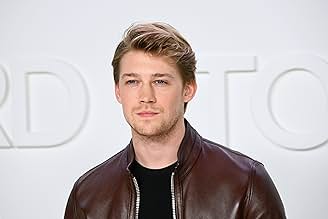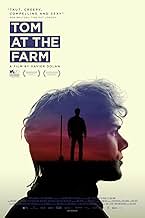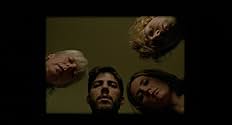IMDb रेटिंग
6.9/10
20 हज़ार
आपकी रेटिंग
एक दुःखी आदमी अपनी प्रेमिका के परिवार से मिलता है, जो अपने बेटे के लैंगिक-रुझान से अवगत नहीं थे।एक दुःखी आदमी अपनी प्रेमिका के परिवार से मिलता है, जो अपने बेटे के लैंगिक-रुझान से अवगत नहीं थे।एक दुःखी आदमी अपनी प्रेमिका के परिवार से मिलता है, जो अपने बेटे के लैंगिक-रुझान से अवगत नहीं थे।
- पुरस्कार
- 9 जीत और कुल 30 नामांकन
Caleb Landry Jones
- Guillaume
- (बिना क्रेडिट के)
Mélodie Simard
- Petite fille
- (बिना क्रेडिट के)
फ़ीचर्ड समीक्षाएं
I've recently seen "Tom à la ferme", and it's safe to say that Xavier Dolan is one of the most important directors alive today. With just 25 years, he has proved to have the maturity and intelligence to make amazing films, which are not only magical in their visual aspect, but in the depth of their screenplays as well.
Having said this, "Tom á la ferme" is no exception. Great movie, wonderful to see, and a very interesting story which is, as always, about love. However, every time Dolan shows us his vision of love, he does it in a very different way. This time is about a lost love, and the submissive aspect of it. Brilliant performances as always, all taking place in a very gloomy farm, the authorial work of Xavier Dolan just keeps getting better, so my advice: let's pay attention to this wonderful filmmaker.
Having said this, "Tom á la ferme" is no exception. Great movie, wonderful to see, and a very interesting story which is, as always, about love. However, every time Dolan shows us his vision of love, he does it in a very different way. This time is about a lost love, and the submissive aspect of it. Brilliant performances as always, all taking place in a very gloomy farm, the authorial work of Xavier Dolan just keeps getting better, so my advice: let's pay attention to this wonderful filmmaker.
To follow the chronic order, I decide to watch this film before Dolan's latest MOMMY (2014), which has just freshly arrived. TOM AT THE FARM is Canadian prodigy and Cannes darling Xavier Dolan's fourth film, adapted from Michel Marc Bouchard's play, this marks the first time he is not the sole writer for his works, it is also a veer of style for him, delves into the murky suspense and violence of a psychological thriller, and notably, in its highly strained chasing-in-the-forest incident near the coda, it conspicuously recalls another exceptional gay-themed thriller Alain Guiraudie's STRANGERS BY THE LAKE (2013, 8/10) of the same year, but these two films end with two completely contrasting options for our protagonists who both face irresistible sexual attraction from the sort who is too dangerous for their own good.
Sported as a perennially tacky curly blond, Dolan plays Tom, an urban advertisement editor who has just lost his boyfriend Guillaume in an accident. Driving en route to attend his funeral in a remote farm, Tom meets Guillaume's family members, his mother Agathe (Roy) and his brother Francis (Cardinal) who lives with her and whose existence has never been informed to Tom until now. On top of that, Agathe seems to be unwitting of Guillaume's sexual orientation, so Tom has to comfort her grievance by telling a white lie that Guillaume has a girlfriend named Sarah (Brochu), who in fact is just one of their common friends. Yet, Francis is the one who actually knows it all, his violent and homophobic behaviour towards Tom strikes a sadomasochistic thrill, which is not merely one-sided, as the film not-so- subtly implies Francis is a closeted homosexual himself. They both desperately or compulsively trace the resemblance or remnants of the deceased in each other, to the degree, Tom actually complies to act as a voluntary hostage on the farm and even enjoys the pastoral drudgery. One night Sarah's visit inopportunely provokes Agathe's deeply- buried agony, while apart from Francis' overcompensated interest in Sarah, Tom learns a horrible episode of his past from a bar owner, which overturns his perception of the tight corner where he is in. The second day, he decides to flee and turns his life back on track.
Here, Dolan again plays the Aspect Ratio gimmick, in the scenes where Tom is physically abused by Francis, it changes from the usual 1.85:1 to a more smothering letterbox; and if one is familiar with his narcissistic disposition, here he continues to wallow in close-ups, mostly on himself especially when Tom is anguish-ridden or being suffocated to barely catch a breath under Francis' masculine domination. While the entire film is coherently enveloped in an overcast dreariness, the close-knitted cast (both Roy and Brochu are from the original play) has done an amazing job in establishing the engaging tensions and occasionally a smack of warmth glistening. Roy and Cardinal are the MVPs, the former is offered a soul-pulverising flare-up while being consistently emotive during all her presence, and the latter beefs up his boorish machismo with very disarming appeal which superbly gilds an atmosphere of ambiguity in Francis' deadly mystique; on top of that the two together also builds up a detrimental mother-son relationship, which also wittily insinuates what has happened to the mother in the end, it is an innovative modus operandi to justify the plot-line without revealing everything in front of viewer's eyes.
As for our triple threat Dolan, with his Joker-alike makeup, he shows beyond doubt that apart from the ostentatious style bandwagon, he certainly is on his way to mature into a multi-faceted filmmaker who is able to tackle with the darkest corner of humanity and leaves his own trademark on it. A final nod to Dolan's cherrypick of songs, Rufus Wainwright's GOING TO A TOWN, appears in the ending credit, is an utterly poignant theme song for Tom's bumpy ride.
Sported as a perennially tacky curly blond, Dolan plays Tom, an urban advertisement editor who has just lost his boyfriend Guillaume in an accident. Driving en route to attend his funeral in a remote farm, Tom meets Guillaume's family members, his mother Agathe (Roy) and his brother Francis (Cardinal) who lives with her and whose existence has never been informed to Tom until now. On top of that, Agathe seems to be unwitting of Guillaume's sexual orientation, so Tom has to comfort her grievance by telling a white lie that Guillaume has a girlfriend named Sarah (Brochu), who in fact is just one of their common friends. Yet, Francis is the one who actually knows it all, his violent and homophobic behaviour towards Tom strikes a sadomasochistic thrill, which is not merely one-sided, as the film not-so- subtly implies Francis is a closeted homosexual himself. They both desperately or compulsively trace the resemblance or remnants of the deceased in each other, to the degree, Tom actually complies to act as a voluntary hostage on the farm and even enjoys the pastoral drudgery. One night Sarah's visit inopportunely provokes Agathe's deeply- buried agony, while apart from Francis' overcompensated interest in Sarah, Tom learns a horrible episode of his past from a bar owner, which overturns his perception of the tight corner where he is in. The second day, he decides to flee and turns his life back on track.
Here, Dolan again plays the Aspect Ratio gimmick, in the scenes where Tom is physically abused by Francis, it changes from the usual 1.85:1 to a more smothering letterbox; and if one is familiar with his narcissistic disposition, here he continues to wallow in close-ups, mostly on himself especially when Tom is anguish-ridden or being suffocated to barely catch a breath under Francis' masculine domination. While the entire film is coherently enveloped in an overcast dreariness, the close-knitted cast (both Roy and Brochu are from the original play) has done an amazing job in establishing the engaging tensions and occasionally a smack of warmth glistening. Roy and Cardinal are the MVPs, the former is offered a soul-pulverising flare-up while being consistently emotive during all her presence, and the latter beefs up his boorish machismo with very disarming appeal which superbly gilds an atmosphere of ambiguity in Francis' deadly mystique; on top of that the two together also builds up a detrimental mother-son relationship, which also wittily insinuates what has happened to the mother in the end, it is an innovative modus operandi to justify the plot-line without revealing everything in front of viewer's eyes.
As for our triple threat Dolan, with his Joker-alike makeup, he shows beyond doubt that apart from the ostentatious style bandwagon, he certainly is on his way to mature into a multi-faceted filmmaker who is able to tackle with the darkest corner of humanity and leaves his own trademark on it. A final nod to Dolan's cherrypick of songs, Rufus Wainwright's GOING TO A TOWN, appears in the ending credit, is an utterly poignant theme song for Tom's bumpy ride.
A young gay man from Montreal travels to rural Quebec to visit the family of his recently deceased partner and attend the funeral. The visit turns into a nightmare. The film is based on the play by Michel-Marc Bouchard who co-wrote the screenplay with director Xavier Dolan. Dolan also plays the main role.
Dolan uses powerful techniques to stir emotion in this bizarre thriller. He also gets great performances from the actors including himself.
The trouble is in trying to understand and empathize with the main character, Tom. He seems to have little or no survival instincts to take care of himself, sometimes even deliberately walking into further trouble.
This is made clear, maybe intentionally, in the second half of the film when Sarah, a friend from Montreal, enters the scene. Sarah at least shows the survival instincts clearly lacking in Tom. There are some hints as to why Tom stays in the dreadful situation but the inconsistencies in his actions cause too much confusion.
Dolan is a powerful artist with much promise at his young age. This was shown in "I Killed My Mother" and "Heartbeats". "Tom at the Farm" has potential but doesn't quite meet the level of the other two films. - dbamateurcritic.
Dolan uses powerful techniques to stir emotion in this bizarre thriller. He also gets great performances from the actors including himself.
The trouble is in trying to understand and empathize with the main character, Tom. He seems to have little or no survival instincts to take care of himself, sometimes even deliberately walking into further trouble.
This is made clear, maybe intentionally, in the second half of the film when Sarah, a friend from Montreal, enters the scene. Sarah at least shows the survival instincts clearly lacking in Tom. There are some hints as to why Tom stays in the dreadful situation but the inconsistencies in his actions cause too much confusion.
Dolan is a powerful artist with much promise at his young age. This was shown in "I Killed My Mother" and "Heartbeats". "Tom at the Farm" has potential but doesn't quite meet the level of the other two films. - dbamateurcritic.
This film succeeds in pulling off what "Stranger By The Lake" totally failed to do. The darkness draws you in and intrigues us, and the characters are brilliantly acted and engaging.
Some of the editing is slightly strange, or perhaps the narrative would be a better way to describe it, i.e. there are a couple of transitions between scenes where I found I was having to piece things together arbitrarily, in my opinion, meaning I had to concentrate hard. However I'd much rather this than everything being spelled out in children's building blocks as is the way with many American films.
This is one of the few "gay" films I've seen that had hardly anything superficial and stereotypical about it, and wasn't depressing to watch as a gay man.
Hats off to the guy who played the crazy brother: dark and scary, but the homoerotic tones and suppressed desires sound through his silence, creating a fascinating villain, again, something which the aforementioned other French-language gay thriller completely failed to do, managing only to be faintly embarrassing and ridiculous.
Some of the editing is slightly strange, or perhaps the narrative would be a better way to describe it, i.e. there are a couple of transitions between scenes where I found I was having to piece things together arbitrarily, in my opinion, meaning I had to concentrate hard. However I'd much rather this than everything being spelled out in children's building blocks as is the way with many American films.
This is one of the few "gay" films I've seen that had hardly anything superficial and stereotypical about it, and wasn't depressing to watch as a gay man.
Hats off to the guy who played the crazy brother: dark and scary, but the homoerotic tones and suppressed desires sound through his silence, creating a fascinating villain, again, something which the aforementioned other French-language gay thriller completely failed to do, managing only to be faintly embarrassing and ridiculous.
We distinctively perceive the characteristic atmosphere of Xavier Dolan's films: all the characters are on edge or even disturbed, and this dark and sensual film is made with a hyper sensitivity and a keen sense of photography.
First at all, Agathe is a mother who mourns her younger son died recently, and seems to understand the whole topic (undisclosed although you do not have to be a genius to intuit it) but represses her feelings and intuitions. Then Sarah a female blonde as hot as lost, and Francis, a farmer who is sexually attracted by Sarah (who would not be?) and hides himself behind a homophobic shell. Right in the middle of this bloody mess, Tom acts, contrary to appearances, like a temporary keystone, the whole microcosm gravitating around him. Although Tom is systematically delicate and cautious, especially with Agathe and even with Francis, in this farm, there is definitely a before and an after Tom, like a bull in a china shop, like a vault without its keystone.
A must see.
First at all, Agathe is a mother who mourns her younger son died recently, and seems to understand the whole topic (undisclosed although you do not have to be a genius to intuit it) but represses her feelings and intuitions. Then Sarah a female blonde as hot as lost, and Francis, a farmer who is sexually attracted by Sarah (who would not be?) and hides himself behind a homophobic shell. Right in the middle of this bloody mess, Tom acts, contrary to appearances, like a temporary keystone, the whole microcosm gravitating around him. Although Tom is systematically delicate and cautious, especially with Agathe and even with Francis, in this farm, there is definitely a before and an after Tom, like a bull in a china shop, like a vault without its keystone.
A must see.
क्या आपको पता है
- ट्रिवियाManuel Tadros (the bar owner) is the father of Xavier Dolan in real life.
- कनेक्शनFeatured in Xavier Dolan: à l'impossible je suis tenu (2016)
- साउंडट्रैकLes Moulins de mon Coeur
(The Windmills of your Mind)
Music by Michel Legrand
English lyrics by Alan Bergman and Marilyn Bergman
French lyrics by Eddy Marnay
Published by EMI U Catalog Inc.
(1968)
Sung a capella by Kathleen Fortin
(heard in the opening sequence while Tom is at the wheel of his car)
टॉप पसंद
रेटिंग देने के लिए साइन-इन करें और वैयक्तिकृत सुझावों के लिए वॉचलिस्ट करें
- How long is Tom at the Farm?Alexa द्वारा संचालित
विवरण
- रिलीज़ की तारीख़
- कंट्री ऑफ़ ओरिजिन
- आधिकारिक साइटें
- भाषा
- इस रूप में भी जाना जाता है
- Tom at the Farm
- फ़िल्माने की जगहें
- मॉन्ट्रियल, क्यूबेक, कनाडा(final scenes)
- उत्पादन कंपनियां
- IMDbPro पर और कंपनी क्रेडिट देखें
बॉक्स ऑफ़िस
- दुनिया भर में सकल
- $6,87,505
- चलने की अवधि1 घंटा 42 मिनट
- रंग
- पक्ष अनुपात
- 1.85 : 1
इस पेज में योगदान दें
किसी बदलाव का सुझाव दें या अनुपलब्ध कॉन्टेंट जोड़ें

![Bande-annonce [OV] देखें](https://m.media-amazon.com/images/M/MV5BYmNhYmI5ZGQtY2MwZS00NDM5LWIwMzktNWZhOTllYjQ0ZDRkXkEyXkFqcGdeQXRyYW5zY29kZS13b3JrZmxvdw@@._V1_QL75_UX500_CR0)





























